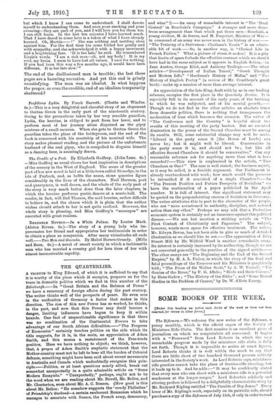1 .1 . 11/1 QUARTERLIES.
A Tarerrrn to King Edward, of which it is sufficient to say that it is worthy of the place which it occupies, prepares us for the truce in domestic politics which we find in this number of the .Edinburgh.—In "Great Britain and the Balance of Power" we have a summary of foreign affairs during the past century. The writer thinks well of the prospects of peace. He even sees in the unification of Germany a factor that makes in this direction. The rise of this new Power has so worked, he thinks, in the past, and now that this Power may itself become a danger, limiting influences have begun to keep it within bounds. One fact of unquestionable significance is that there was no combination of the Continental Powers to take advantage of our South African difficulties.—" The Progress of Economics " certainly touches politics on the side which its title suggests, for it is, in the main, an appreciation of Adam Smith, and this means a restatement of the Free-trade position. Here we have nothing to object; we think, however, that, a propos of Adam Smith's emphatic statement that the Mother-country must not be left to bear all the burden of Colonial defence, something might have been said about recent movements in Australia and Canada which undoubtedly recognise this prin- ciple.—Politics, or at least questions nearly allied, break out somewhat unexpectedly in a quite admirable article on " Some Modern Essayists." " Unexpectedly," perhaps, ought not to be the word when we are reading about Mr. Birrell, Mr. Belloc, and Mr. Chesterton, even about Mr. A. C. Benson. (How good is this about Mr. Bello,: "He somehow suggests the 'rowdy Philistine' of Friendship's Garland—a certain exuberant Romanism which he manages to associate with Sussex, the French army, democracy,
and wine" !)—An essay of remarkable interest is "The Dual Control' in Bourbaki's Campaign." A stranger and more disas- trous arrangement than that which put three men—Bourbaki, a young civilian, M. de Serres, and M. Freycinet, Minister of War— in command of an army was never seen in the history of war.- " The Training of a Statesman : Chatham's Youth " is an admir- able bit of work.—So, in another way, is "Clerical Life in French Fiction." What a picture of storm it makes ! It is a pity that limits of space forbade the effective contrast which we should have had in the same subject as it appears in English fiction,—in Jane Austen, George Eliot, and Anthony Trollope.—The other articles—" Development of Italian Travel," " Greek Thought and Modern Life," " Hardman's History of Malta," and "The History of English Poetry" (a review of Mr. Courthope's great book)—make up a number of more than average interest.
An appreciation of the late King, dealt with by us in our leading columns, occupies the first place in the Quarterly Review. It is especially full in its account of his early years, of the training to which he was subjected, and of his mental growth.— Though we do not find in the other articles an absolute truce from domestic politics, there is nothing that transgresses tho moderation of tone which becomes the occasion. The writer of "The Conference and the Country" is hopeful about tha results of this meeting of the party leaders. But no essential diminution in the power of the Second Chamber must be among its results. Still, some substantial change may well be made. "Liberal in the party sense it [the House of Lords] caa never be ; but it might well bo liberal. Conservative in the party sense it is, and should not be ; but like all effective Second Chambers it should be conservative." Can any reasonable reformer ask for anything more than what is hers conceded?—This view is emphasised in the article, " Two Chambers or One ?" The case is well stated; the business aspect, as it may be called, is a forcible argument. Our Parliament is already overburdened with work ; how much would the pressure be intensified if it consisted of a single Chamber P—In "The Present Position and Future Prospects of Socialism" wo have the continuation of a paper published in the April number. It is full of interest. One significant statement may be quoted on the preponderating success of Socialism in Germany. The writer attributes this in part to the character of the people, who are "more accustomed to authority, discipline, and ordered action than any other." Perhaps we may add that a Protective economic system is certainly not an insurance against this political disease.—We can but mention a striking article on "The First Contact of Christianity and Paganism." The subject, however, wants more space for effective treatment. The writer, Mr. Edwyn Bevan, has not been able to give as much of detailo 1 illustration as we should like to see.--The appreciation of John Stuart Mill by Mr. Wilfrid Ward is another remarkable essay. Its interest is certainly increased by its authorship, though we are not converted generally to the practice of the signed article.— The other essays are " The Beginning and the End of the Second Empire," by H. A. L. Fisher, in which the story of the final and fatal proceedings of the Emperor and his Ministers is graphically told ; " The Prose of Sir Walter Scott," by A. W. Verrall ; The Genius of the River," by F. G. Aflalo ; "Birds and their Colours," by Hans Gadow ; "The History of the Sikhs "; and "Some Recent Studies in the Problem of Cancer," by Dr. W. d'Este Emery.






































 Previous page
Previous page